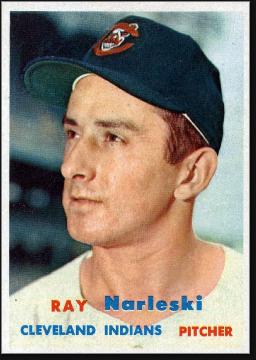
Sport: Baseball
Born: November 25, 1928
Died: March 29, 2012
Town: Camden, New Jersey
Raymond Edmond Narleski was born November 25, 1928 in Camden, NJ. His father, Bill, was a minor-league infielder who played in the big leagues for the Red Sox in 1929 and 1930. Ray had four siblings, one of whom—Ted Narleski—was a star running back for UCLA in the early 1950s and was inducted into the UCLA Sports Hall of Fame. Ray was a standout football and baseball player who was 19 by the time he began his senior spring at Collingswood High. The family had moved several times in South Jersey during the 1940s and he had to redo a couple of terms. At 19, he was ineligible to play baseball. Many scouts thought he was injured.
The Indians knew the real story about the hard-throwing teenager. They signed Ray as a pitcher and his dad as a scout. Part of the deal was that he would have a Triple-A contract by his second season, but when he went 2–10 in Class A in 1948, the Indians reneged on their agreement. So Ray sat out the entire 1949 season. He returned to baseball the following year and put together four excellent seasons. In the final one (1953) he was converted to relief pitching.
In 1954, Ray made the Indians in Spring Training. He, roommate Don Mossi and future Hall of Famer Hal Newhouser anchored the bullpen for a powerhouse club that ended up winning a league-record 111 games. Ray went 3–3 with 13 saves. His rising fastball was too tempting for enemy hitters to lay off, so he would take them up the ladder and either pop them up or strike them out. The Indians won the pennant but lost the World Series to the Giants 4 games to 0. Ray pitched four innings against the Giants and gave up one run.
The Indians did not repeat in 1955, but it was no fault of Ray’s. He went 9–1 and saved a league-high 19 games. Ray finished 6th in the MVP voting, higher than any AL pitcher. Ray pitched three more years for Cleveland and was an All-Star in 1956 and 1958—the former as a reliever and the latter as a starter. Ray would have had a shot at 20 wins, but was moved back to the bullpen in the second half of the ’58 campaign.